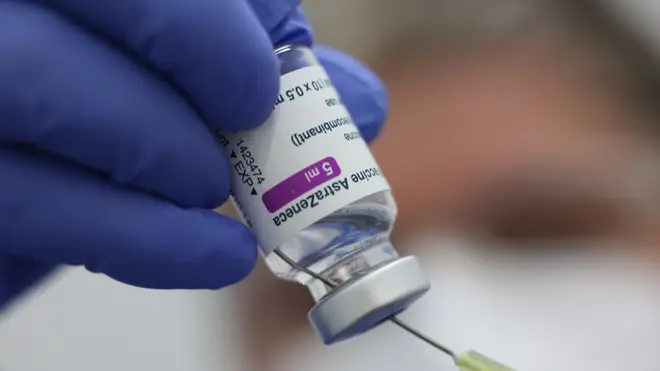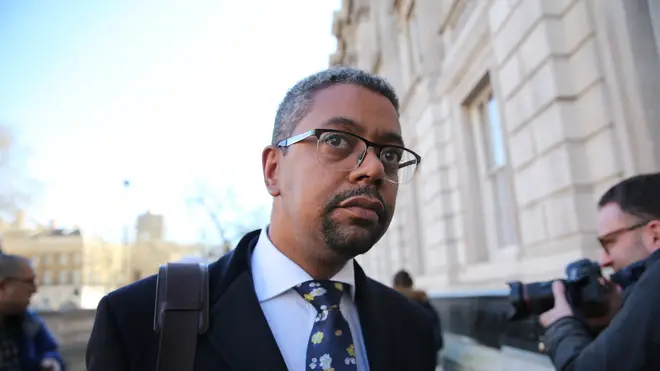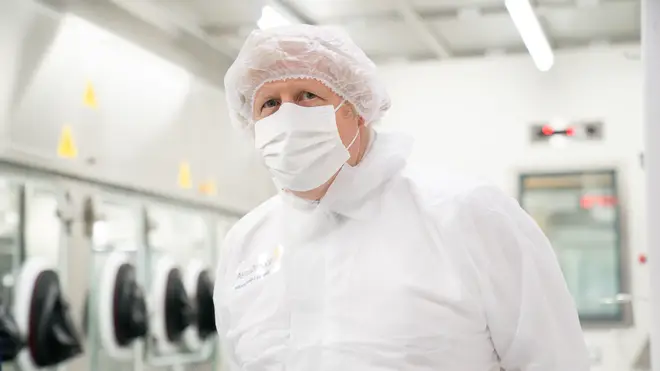
Paul Brand 10am - 12pm
7 April 2021, 12:28

Blood clots from AZ jab 'such a rare' reaction, says former MHRA chief
The former head of the UK's medicines regulator has told LBC he has "no reservations" about the Oxford/AstraZeneca vaccine, saying the risks from Covid are "much higher".
Asked by Nick Ferrari at breakfast today whether he would recommend someone in their 40s gets the AstraZeneca jab, former MHRA chief executive Professor Sir Kent Woods said: "Yes I would in fact.
"Relatives of mine are in that situation and I have no reservations about the vaccine."
Nick then pushed Sir Kent on this, asking him if he really has "no reservations at all".
"I think the problem is that what we are looking at is such a very very rare event, this particular type of blood clot is such a rare event, that the limit of what is detectable as an adverse drug reaction, is something we need to bear in mind at all times," he replied.
"The risks of Covid are much higher."
People in the UK are still being advised to go and get their jab when called up.

His comments come as the Oxford/AstraZeneca vaccine trial on children has been paused while a possible link to blood clots is investigated.
The University of Oxford said it had paused giving doses of the vaccine in the study while it waits for further information about the rare problem in adults who received it.
Assessments are under way into a very rare and specific type of blood clot in the brain, known as cerebral venous sinus thrombosis (CVST), occurring together with low levels of platelets (thrombocytopenia) following vaccination in adults.

Business minister: AZ jab has 'no proven links yet' with blood clots
The World Health Organisation (WHO) and the European Medicines Agency (EMA) are expected to announce findings of their assessments on Wednesday or Thursday.
The UK's regulator - the Medicines and Healthcare products Regulatory Agency (MHRA) - is also investigating reports but has not confirmed when it will present its findings.
Both the MHRA - which said it had identified 30 cases of rare blood clot events out of 18.1 million doses of the jab administered up to and including March 24 - and WHO have said that to date the benefits of the vaccine in preventing coronavirus outweigh any risks.
Dr Maggie Wearmouth, a member of the Joint Committee on Vaccination and Immunisation (JCVI), indicated that "perhaps slowing things down" with the rollout "until we're absolutely certain" might be wise.
Speaking in a personal capacity, she told the Daily Telegraph: "The issue is about safety and public confidence. We don't want to cover anything up that we feel that the public should be knowing.
"We're not here to blindly follow targets or due dates. We will do what is necessary."

Aspirin is 'probably more dangerous' than Oxford jab says SAGE member
Sir Kent continued: "But the reason it is so difficult to be certain whether or not there is a cause and effect relationship, even in younger people, between the vaccine and these clotting events is that there are such clotting events occurring in the background anyway.
"They are not unique to treated patients, they do occur anyway. There was a study in Australia a few years ago, before Covid, which suggested there may be around 15 every million per year. So it is not an unknown event.
Read more: Number of first vaccine doses in UK drops to lowest daily level since early January
Read more: US trials show Oxford vaccine safe and effective
"And the second problem is that Covid itself is known to be associated with an increased risk of blood clots of various kinds.
"Now at a time when the population has a lot of Covid going around, it's very difficult to know what the actual background number of these clotting events is without the vaccine.
"We can say I think, that if there is a connection, it's a very rare one and this is why I am not concerned about people having the AstraZeneca vaccine."

Business Minister scrutinised over vaccine supply problems
And Welsh Health Minister Vaughan Gething told LBC News that
"We know that when vaccines and other new medicines or drugs go through clinical trials it is not unusual for an incident to pause the trial to understand what that means," he explained.
"It doesn't mean the vaccine isn't safe, but it is part of understanding whether there are side effects or whether it is something that is in the population more generally.
"So that's what we are seeing now with the AZ. And I think it should give people confidence actually that if you discover an issue you pause, understand and then carry on with the trial when it is safe to do so."
He continued: "When it comes to the broader issue about blood clots, and I know there is some publicity about this, we are still in a position where the risk of blood clots is very low, there is no proven link with the AZ vaccine.
"Not only that, but there is a proven link with coronavirus and this."
The minister was then pushed on whether Wales is halting the AZ rollout, to which he replied: "Yes. I am 47, and I have had my vaccine. I had the AZ vaccine, and I have no concerns about having the AZ vaccine for a second dose as well."

His comments were also supported by Professor Calum Semple, who told Nick he is "not worried one little bit" about headlines around the AstraZeneca vaccine.
The Sage scientist told LBC: "I'll take myself, I'm 53, my risk of death from Covid is about one in 13,000, for me it's a no-brainer, I need to have the vaccine."
He later added: "This vaccine is safe. What do I mean by safe? You can look right, look left, look right again cross a road, it's safe to cross because you don't see any cars (but) you can trip, you can stumble.
"Nothing is risk-free, but is the vaccine safe? I would say yes."
And Small Business Minister Paul Scully also told LBC this morning he would "absolutely" have the AstraZeneca vaccine as there is currently "no proven link" between the jab and blood clots.
Read more: France and Germany suspend use of Oxford/AstraZeneca Covid-19 jab
Read more: Seven die of blood clots in UK after AstraZeneca jab but no evidence of link

Regulators in Europe and the World Health Organisation (WHO) are determining data about the jab's potential links to blood clots.
The WHO and the European Medicines Agency (EMA) said they will publish their findings later this week.
On Tuesday, Boris Johnson defended the vaccine at the AstraZeneca plant in Macclesfield, Cheshire.
He said: "The best thing people should do is look at what the MHRA say, our independent regulator - that's why we have them, that's why they are independent.
"Their advice to people is to keep going out there, get your jab, get your second jab."
He added: "The best thing of all is to vaccinate our population, get everybody out getting the jab, that's the key thing and that's what I would advocate, number one."